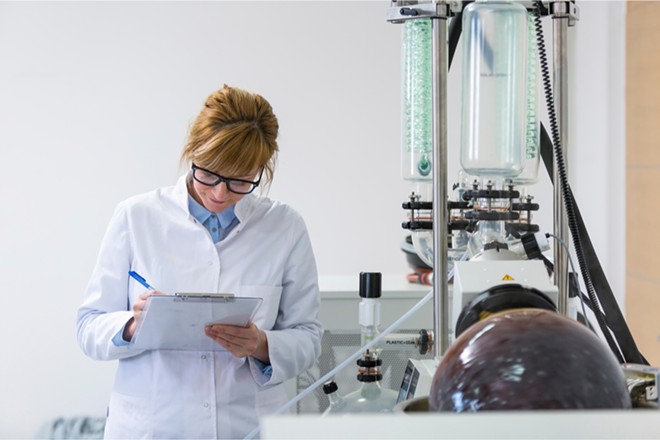ADVERTISEMENT: Orlando Weekly news staff was not involved in the creation of this content. Please note, this report is not meant to treat or diagnose any illness. It is written for informational purposes only. If you have any health concerns, please see a licensed healthcare professional.
Projected to reach a value of more than $47 billion by 2028, the CBD industry is growing faster than practically any other sector of the natural health economy. This rapid growth is only getting faster, fueled in part by recent advancements in the technology used to cultivate, process, and market CBD products. With the massively expanding CBD industry setting itself up to smash even the most optimistic expectations, find out how technology is making the internet’s best CBD oils even better.What Is CBD Technology?
“CBD technology” refers to the hardware and software that CBD producers use in their industry. Every time a human uses a tool, in fact, that’s an example of technology in action. The tools we use evolve quickly, and the best way to stay ahead in the CBD industry—or any other industry—is to incorporate new technology before your competitors.
While growers seem to come up with increasingly complex hydroponic and soil hemp cultivation systems every year, the truly impactful innovations have occurred behind the scenes in the ways hemp producers automate their production, keep track of their inventory, and market their products.
Examples of Technological Advancement in the CBD Industry
CBD technology now relies heavily on machine-learning driven inventory management software, and these days, bots even monitor CBD-rich hemp during cultivation. Four specific areas in which technology is revolutionizing CBD production include:
1. Cultivation Management Technologies
Hardly anyone cultivates hemp without using any technology at all anymore. The degree to which individual hemp producers have incorporated the latest and most useful technological advancements vary considerably, though, even though the advantages leveraged by early adopters are abundantly apparent.
From transplanting clones to harvesting mature plants, fully automated or human-assisting robotics have reduced the tedium and increased the efficiency of traditionally tedious tasks involved in hemp cultivation. Many high-tech hemp farms have now created cloud-hosted copies of their entire cultivation and production facilities—advancements in RFID tagging have made it easy to keep track of the exact location of products and other company assets at all times.
New machines prevent human hemp cultivators from making mistakes due to lack of data. Environmental testing equipment keeps a close eye on soil conditions, ambient humidity, and other variables that can make or break a hemp crop. Contemporary tools can even detect common pests before they become problematic.
2. Advanced Extraction Methodologies
Extraction has come a long way since the dawn of the general-market CBD industry circa 2012. Originally, only full-spectrum CBD was available, and it was usually extracted with butane or ethanol.
Then, isolate CBD burst onto the scene, and by the time the 2018 Farm Bill passed, solventless CO2 extraction was well on its way to becoming the norm. The last few years have seen the rise of broad-spectrum CBD, a THC-free but massively misunderstood new form of hemp extract.
To remove its THC content, broad-spectrum CBD is subjected to a considerably more strenuous purification process than is applied to full-spectrum extracts. While it’s possible to produce broad-spectrum CBD without damaging any of its chemical components, only companies that have adopted the latest technologies stand a chance of pulling the process off correctly.
3. Machine Learning and AI
Automated business management software is helping CBD producers track their inventories and optimize their workflows. AI-driven fintech is providing CBD brands with the financing they need to reach new heights. Next-generation data science is leveraging consumer buying habits to boost the reach of CBD marketing.
AI is even helping consumers find the right CBD products. Search engines have undergone massive overhauls over recent years, learning to generate snippets that answer product-related consumer questions on-page, reducing the steps necessary to purchase CBD.
4. Increased CBD Bioactivity
Some of the technology-derived enhancements to the CBD industry have occurred entirely in the realm of the physical. We’ve already mentioned how technology has assisted the evolution of CBD extraction, but it has also delivered entirely new forms of CBD extract.
Overall production advancements have made almost every CBD product on the market more effective than even the best products of 10 years ago, but the advent of water-soluble CBD marks the birth of an entirely new era of online hemp in which faster activation times and better bioavailability are the norm. It will be a while before producers solve water-soluble CBD’s stability concerns, however.
The Future of CBD Technology
The days in which hemp is cultivated entirely automatically and processed without human intervention may be nearer at hand than they seem. What’s clear is that technology has already advanced the value and accessibility of the CBD industry to heights that seemed unthinkable just a few years ago. With CBD technology evolving every day, it’s only a matter of time until we’re faced head-on with the next industry-reshaping innovation.
–
The statements made in this sponsored post are those of the paid sponsor and not those of Orlando Weekly, and are not intended as medical advice. Consult your doctor before undertaking any changes to your physical, mental or dietary health.


